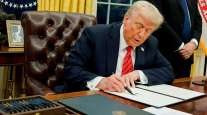Supreme Court Rejects Challenge to Trump’s 25% Steel Tariffs

[Ensure you have all the info you need in these unprecedented times. Subscribe now.]
The U.S. Supreme Court left intact President Donald Trump’s 25% tariffs on imported steel products, rejecting an industry trade group challenge that sought to strip the president of a powerful legal tool for imposing duties.
The rebuff marks the second time the justices have turned away the American Institute for International Steel on Trump’s tariffs. The court made no comment in refusing to hear the group’s appeal.
The appeal contended that the provision Trump invoked, known as Section 232, gives the president such broad discretion to impose tariffs on national security grounds that it violates the Constitution.
“Section 232 is astonishing in the breadth of discretion, both in the finding that triggers its application and in the completely unbounded choice of remedies afforded the president, including the amount of any tariffs or quotas,” the trade group argued.

COVID-19 has placed significant strain on many freight networks. So how are third-party logistics providers adapting to meet these challenges? Host Seth Clevenger chats with two 3PL executives who have had firsthand experience contending with this crisis. Hear a snippet, above, and get the full program by going to RoadSigns.TTNews.com.
The industry group said a ruling in its favor would have let companies recoup some of the $6 billion-plus in tariffs that have been paid so far.
Trump imposed the 25% steel tariff, along with a 10% duty on aluminum imports, in March 2018. Some countries, including Brazil and South Korea, have negotiated deals to avoid the tariff, and Trump dropped the duty for imports from Canada and Mexico. But the tariffs still apply for much of world, including the European Union and China and Japan.
Trump also has threatened to invoke Section 232 to place tariffs on imported automobiles and parts.
Congressional Guidance
The trade group pointed to the “nondelegation doctrine,” a rarely used constitutional rule that says Congress must give clear guidance to an agency before handing off its legislative responsibilities. The Supreme Court’s conservatives indicated in a ruling last year they are interested in revitalizing the nondelegation doctrine.
The Trump administration urged the court to reject the appeal, saying Congress gave the president adequate guidelines for exercising Section 232 authority.
Section 232 “sets forth both the policy the president must pursue and the boundaries of his authority,” U.S. Solicitor General Noel Francisco argued. In addition, it “empowers the president to exercise discretion in fields (foreign affairs and foreign trade) that are already within the scope of executive power.”
The Supreme Court upheld Section 232 in 1976, saying it gives sufficient guidance to the president to pass constitutional muster.
The Supreme Court rejected a similar appeal from the steel-industry trade group last year.
The case is American Institute for International Steel v. United States, 19-1177.
Want more news? Listen to today's daily briefing:
Subscribe: Apple Podcasts | Spotify | Amazon Alexa | Google Assistant | More




